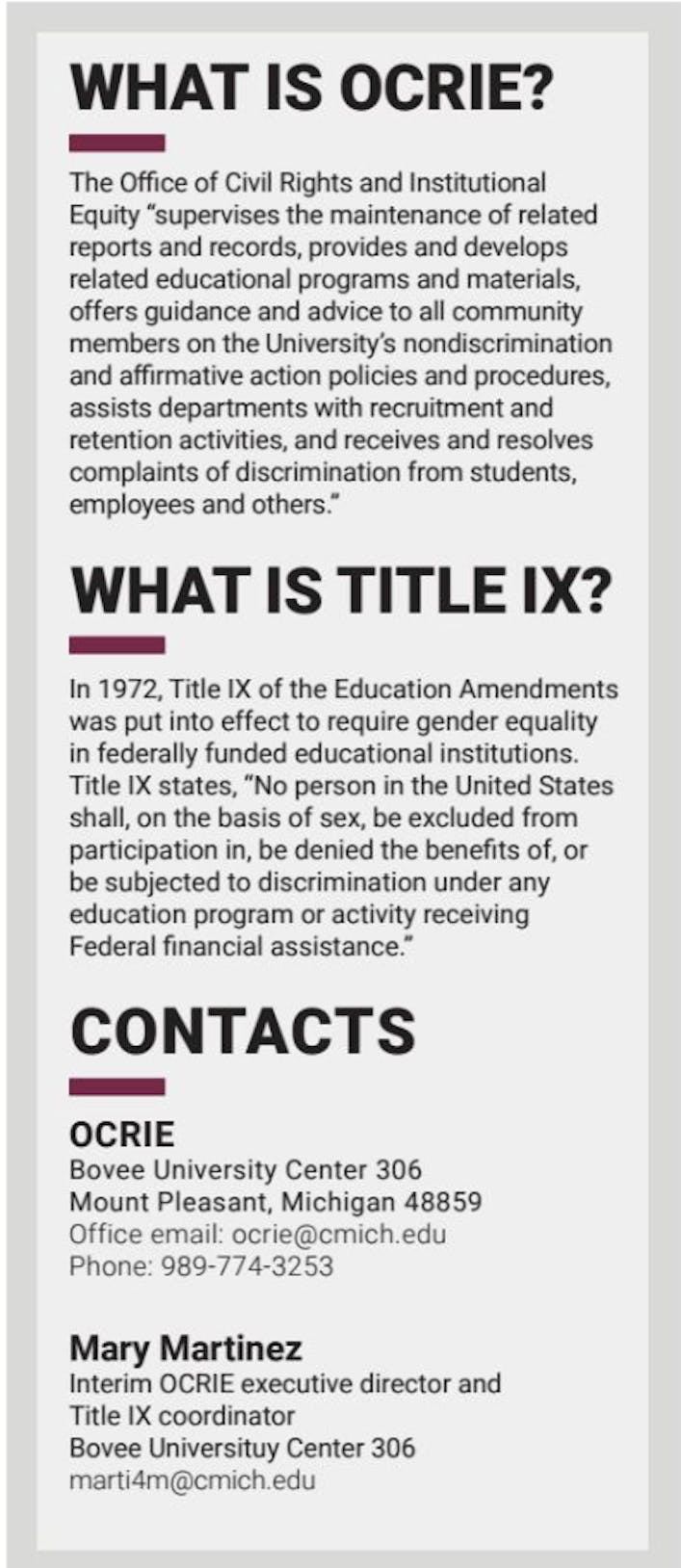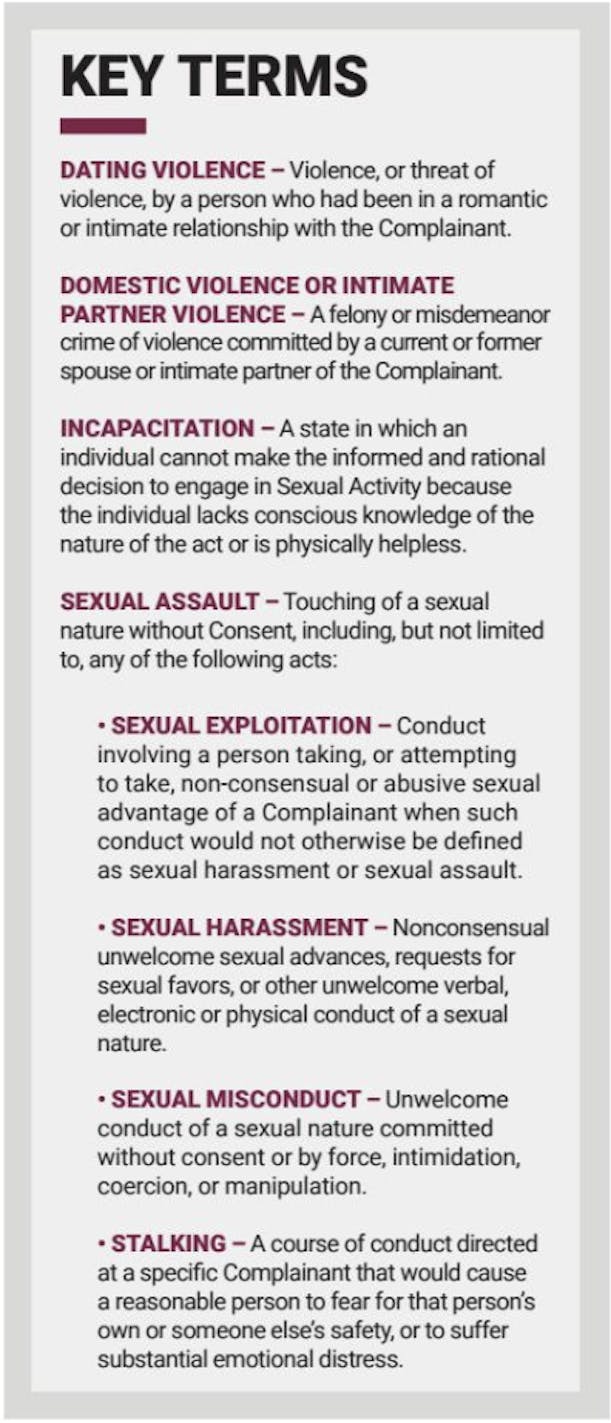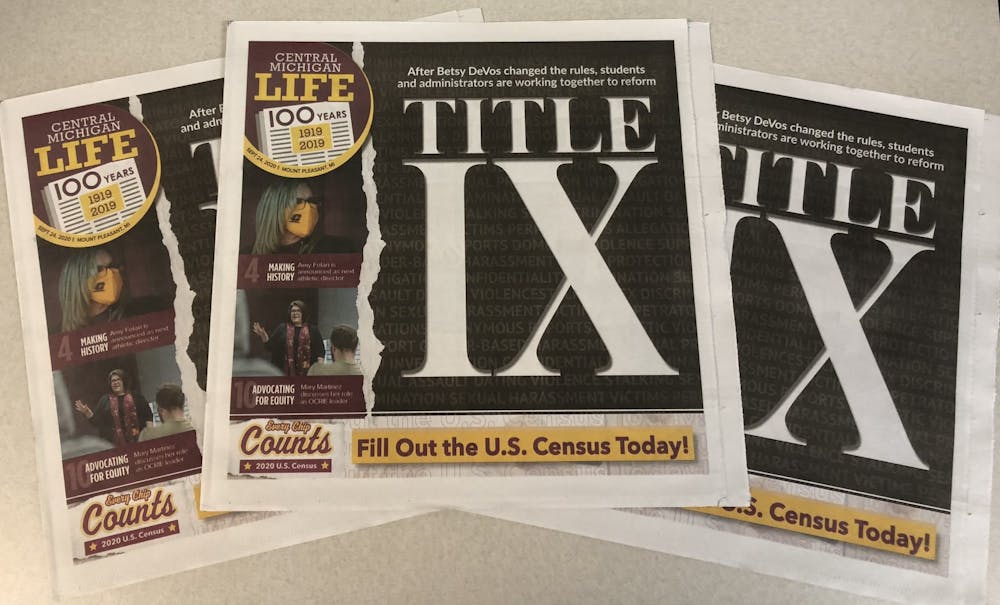Students, administrators work together to reform Title IX
During the summer before her junior year, Kaylee Kok finally got the email she had been waiting for. The student who drugged and sexually assaulted her would not be allowed to return to Central Michigan University that fall.
In February 2017, Kok attended an off-campus party with a friend who was visiting Mount Pleasant. At the party, she was introduced to a male student, who asked the friends to hangout with him at his apartment.
“Originally, I just tagged along to be a good wing-women,” the Jackson graduate student said. “Eventually, when we got (to his apartment), I was drugged.
"After it happened, I don’t really know how I got out of it, but I got out of it, ran downstairs and just started running with my friend back to my apartment.”
A few days later, Kok went to the Central Michigan University Police Department to report the incident. Officers suggested contact the Office of Civil Rights and Institutional Equity (OCRIE) for assistance.
OCRIE organizes and monitors CMU's affirmative action/equal opportunity efforts and compliance with state and federal statutes. They resolve complaints of discrimination from students, employees and others.
After making an appointment, Kok met with Mary Martinez, then OCRIE and Title IX Deputy Director, to discuss her experience and her options moving forward.
“Basically, my whole work with them was to get him permanently dismissed," Kok said. "That was my goal."
Kok and Martinez met with Director of Student Conduct Tom Idema, who would make any final decision. After four months, she was informed that her rapist would not be returning to Central Michigan University in the fall.

Title IX prohibits federally funded educational institutions from discriminating against students or employees based on sex. OCRIE works to enforce Title IX. The combination of the two helps people, like Kok, who have been sexually assaulted or discriminated against cope, seek justice or find closure.
OCRIE can be used if a member of the CMU community is being discriminated by another based on: age, color, disability, ethnicity, familial status, gender, gender expression, gender identity, genetic information, height, marital status, national origin, political persuasion, pregnancy, childbirth or related medical conditions, race, religion, sex, sex-based stereotypes, sexual orientation, transgender status, veteran status, or weight.
On May 6, 2020, U.S. Secretary of Education Betsy DeVos released a 2,000 page document of changes to Title IX and required schools to have them in effect by Aug. 14.
These changes include switching the definition of sexual harassment from ”unwelcome conduct of a sexual nature” to “unwelcome conduct determined by a reasonable person to be so severe, pervasive, and objectively offensive that it effectively denies a person equal access to the school’s education program or activity.”
“Devos took historic action today to strengthen Title IX protections for survivors of sexual misconduct and to restore due process in campus proceedings to ensure all students can pursue an education free from sex discrimination,” a May 6 press release from the U.S. Department of Education read.
Martinez, the now interim executive director of OCRIE and Title IX coordinator, said the Department of Education gave Title IX a new, very narrow definition.
According to Martinez, if something meets the definition, there is a specific way the university must respond and what that should look like. However, it is up to the university to decide what to do with everything that does not meet the definition.
CMU was required to sort through and implement the new Title IX guidelines then decide what to do with other issues of misconduct not covered.
Effect of changes at CMU

After hearing about the changes and the 100-day implementation deadline, Martinez and staff from several CMU offices focused on what to include in the Title IX policy changes.
Since protections under Title IX were narrowed, OCRIE decided to modify and expand its "Sexual Misconduct Policy" into the more encompassing "Sexual and Gender-Based Misconduct Policy."
Martinez said the biggest change was reevaluating the way CMU investigates and determines responsibility. As a result, OCRIE changed its singular investigation model to a hearing model.
With a single investigator model, a single OCRIE investigator gathers and compiles statements and evidence. The same person then analyzes facts from the investigation to determine, "by the preponderance of the evidence," if a OCRIE policy was or was not violated.
In the new hearing model, an investigator gathers and compiles statements and evidence. A hearing officer then convenes a hearing, after which, the hearing officer would analyze the facts from the investigation and hearing to determine, "by the preponderance of the evidence," if the policy was or was not violated.
“Title IX has changed, but the culture and what is and what is not acceptable at CMU has not changed,” Martinez said. “Everything that was prohibited before the changes on Aug. 14, is still prohibited now.”
A group of CMU students – the Title IX Taskforce – is working alongside Martinez to make these changes.
Title IX Task Force
Although Devos and the federal government claim changes to Title IX policy benefit students, CMU students have created the Title IX Task Force to speak out about new modifications.
After attending a virtual “Know Your IX” conference at the end of June, Bay City senior Elise VanParis created the Title IX Taskforce with 10 other students and recent alumni. The group created a petition and a social media campaign to educate the CMU community.
The task force worked closely with Martinez to address their concerns regarding the new Title IX policy and how it could affect CMU students.
“She’s been really receptive to our Task Force, and she's happy to see students are involved,” VanParis said. “She wasn’t offended or anything by the fact we were pushing for this transparency from the administration and making sure the changes are good for the community.”
The task force is collaborating with the Organization of Women Leaders. The two student groups and OCRIE are hosting a virtual town hall to discuss changes regarding Title IX at 7 p.m. Oct. 5.
“At this point, I’m just really hoping that we’re able to make people aware of the changes, because I don’t think a lot of people were aware this was happening anyways," VanParis said. "And (to) hold everyone accountable for making sure that everyone has the justice that they are looking for when reporting sexual misconduct."









